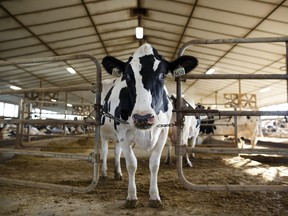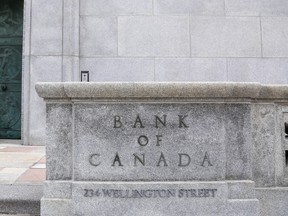Accuses Trudeau government of breaking its promises on dairy imports under the Trans-Pacific Partnership
Article content
New Zealand is initiating a formal trade dispute against Canada, accusing the Trudeau government of breaking its promises on dairy imports under the Trans-Pacific Partnership (TPP) agreement.
Advertisement 2
Article content
The move is part of a growing international backlash against what is seen as Canada’s limp embrace of its dairy obligations under recent trade agreements in North America, Europe and Asia-Pacific.
Trading partners have been historically critical of the Canadian supply management system, which uses production controls and tariffs to protect domestic dairy farmers. As a concession to those trading partners, Canada has agreed to let some imported butter and cheese slip past the tariff barrier. That tariff-free dairy is known as the tariff-rate quota, or TRQ. Those quotas were expanded under the TPP in 2018, as well as under the United States-Mexico-Canada Agreement (USMCA), the pact that replaced the North American Free Trade Agreement in 2020.
Advertisement 3
Article content
Major global dairy exporters, including New Zealand and the United States, welcomed the concession from Canada. But soon they were complaining that Canada had found a loophole by handing out the majority of the TRQs to Canadian dairy processors. By doing so, trading partners argued, Canada makes sure only low-value milk and cheese are brought in and manufactured into higher-value retail products — if the processors opt to use the quota at all.
New Zealand, one of the 11 countries in the TPP agreement, said many of its TRQs with Canada are unfilled, representing roughly $55 million in lost market access over the first two years of the deal.

“Canadian domestic processors sit on unused quota allocation because as competitors they have no interest in giving Canadian consumers or customers the option of accessing high quality, specialized, and more affordable dairy products from New Zealand,” Malcolm Bailey, chairman of the Dairy Companies Association of New Zealand, said in a statement cheering on the trade dispute.
Advertisement 4
Article content
Canadian Trade Minister Mary Ng’s office pushed back, saying the government takes its commitments under the TPP seriously.
“Canada is a fair trading partner,” spokesperson Alice Hansen said in an email. “Our government will always stand up for Canada’s dairy industry, farmers and our supply management system. We have consistently said we will work with industry and with New Zealand on this issue, and we will continue to do so.”
Our government will always stand up for Canada’s dairy industry, farmers and our supply management system
Alice Hansen, spokesperson for Trade Minister Mary Ng
New Zealand lodged a formal request for consultations with Canada on May 12, Bloomberg reported. The request marks the first phase in the dispute resolution process laid out in the TPP. It’s also the first time New Zealand has ever launched a trade dispute under a free trade agreement, and the first time any party has launched a dispute under TPP, the New Zealand government said in a news release.
Advertisement 5
Article content
“Our priority is to ensure that New Zealand exporters have meaningful access to the benefits negotiated under CPTPP,” New Zealand Trade Minister Damien O’Connor said in a statement.
Canada has seven days to respond to New Zealand’s request.
“New Zealand has an excellent relationship with Canada, who are one of our closest partners in the world,” O’Connor said on May 12. “Occasionally even good friends disagree, and it’s for that reason dispute settlement mechanisms in free trade agreements … exist.”
-

‘We had a deal’: U.S. dairy farmers accuse Canada of playing games in cheese dispute
-

New Zealand cheers Canada’s loss in dairy dispute and calls for ‘significant reform’
-

Blood in the water: Ottawa likely to face more trade battles after losing U.S. dairy dispute, lawyers say
-

Ottawa’s defeat in dairy dispute with U.S. could mean more choice at the cheese counter for consumers
Advertisement 6
Article content
New Zealand isn’t the first trading partner to launch formal proceedings against Canada’s dairy policies. Earlier this year, the United States won a key ruling from a dispute resolution panel that found Canada’s TRQ allotment system was in violation of the USMCA. Canada rolled out a new TRQ system for consultations in March, which U.S. dairy exporters said only swapped one protectionist policy for another.
Trade law experts suggested the loss to the U.S. would spark copy cat actions from other trade partners, under other agreements, who were equally frustrated with Canada’s tactics on dairy. Shortly after that, New Zealand publicly cheered the ruling and called for “significant reform” to Canada’s TRQ system.
In response to those remarks, Global Affairs Canada spokesperson Lama Khodr said fill rates on TRQs under the TPP are “very high” for key products such as cheese and butter. “Over the last two years, the Butter TRQ has been almost completely filled, virtually all of which was of (New Zealand) origin.”
• Email: jedmiston@postmedia.com | Twitter: jakeedmiston
Advertisement
Canada target of New Zealand trade dispute in growing dairy backlash
2022-05-12 20:23:59





